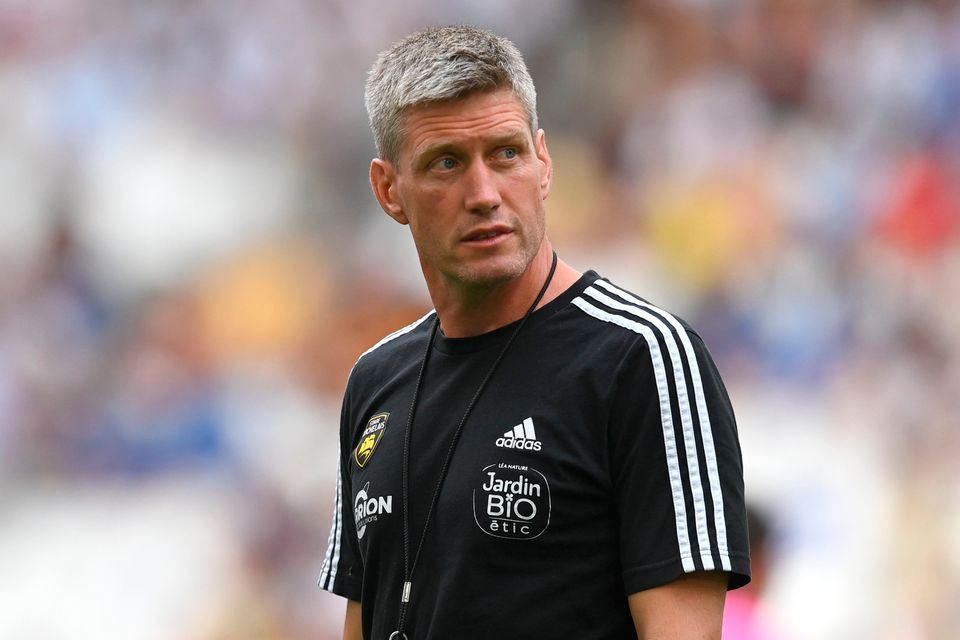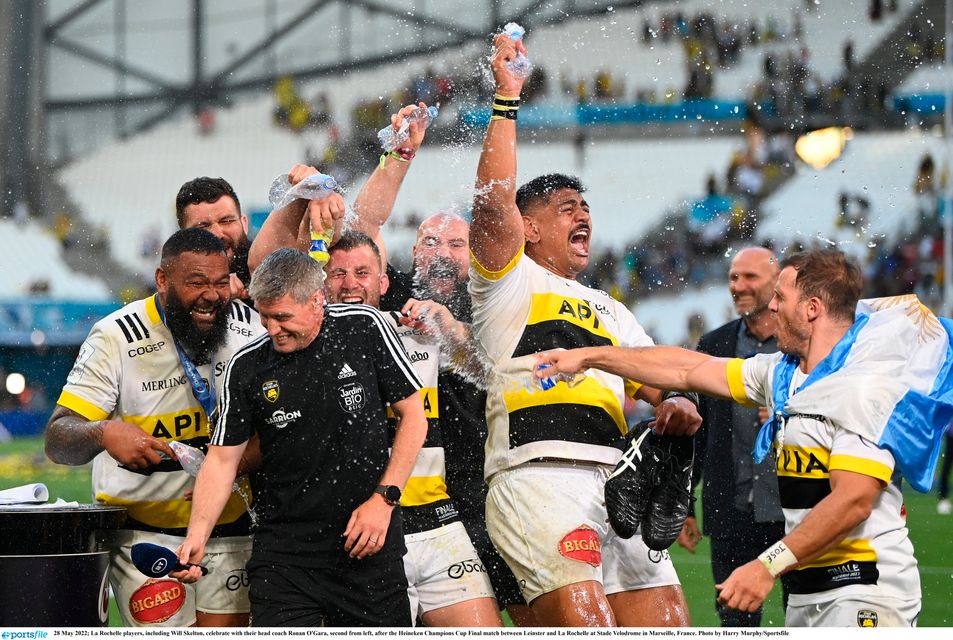‘The word ‘failure’ is not in my vocabulary’ – Ronan O’Gara’s Euro vision for La Rochelle is more about dynasty than destiny
Ronan O'Gara — © SPORTSFILE
Europe for La Rochelle, and their head coach, Ronan O’Gara, is no longer about destiny.
That much was finally achieved last year, when Arthur Retière's dramatically late intervention sealed their first European triumph.
Now it is all about dynasty.
It is why they have maintained their twin pursuits at home and abroad, in league and cup, chasing two hares in the knowledge that both may somehow wriggle free.
And also why O’Gara, spurning fluttering eyelashes all over the world - from New Zealand to Twickenham, if not quite Cork or Limerick, yet – has signed a five-year deal to finish a job he feels he has only started.
For him, that Marseille triumph did not represent a sense of an ending; rather, it marked the beginning of everything.
Having been repelled once at the final hurdle, O’Gara’s keen tactical acumen, predominantly spoiling the hitherto fastest ruck speed in European rugby, de-railed a Leinster side who had blitzed Toulouse in the preceding round.
Those two names are significant, for O’Gara has for so long enviously admired their long-standing domestic and European eminence.
And his primary aim now is to ensure that his La Rochelle side supplant them both, at home and abroad.
They remain Top 14 bridesmaids but still sustain a challenge there, only a point behind Toulouse in the standings.
On Saturday, in Bordeaux, they take the penultimate step towards retaining their Champions Cup crown when they take on Exeter Chiefs, where most wise judges expect them to prevail.
This week, he has spoken of how the ‘fervour’ within his squad, and the passionate support base who have sold out their home crowd for 80 successive matches at the Stade Marcel-Leflandre, mirror feelings that he once experienced in Munster.
Their glory days in Europe are a distant memory now, the two triumphs between 2006 and 2008 representing an apex of achievement, a conclusion to a marvellous odyssey, rather than its continuation.
When he left Munster to begin his own peripatetic journey as a coach, he lamented the fact that his former charges were unable to maintain their status, Leinster’s crushing success in a 2009 semi-final signalling for many an indisputable changing of the guard, at home and abroad.
As he has said before, that famous semi-final in Croke Park, reversing the fortunes of the same fixture in Lansdowne Road three years earlier, announced a shift in the balance of power.
Munster, he said, were never the same force again, losing to Toulon in 2011 before failing to qualify for the knockout stages for the first time in 13 years; Leinster assuming their mantle, stitching four stars on their shirts in less time than it had taken their once pioneering rivals to win two.
Danny Mullins — © SPORTSFILE
In journeys to the south, with Crusaders, and an eye-opening stint in Racing 92, a club with style but lacking substance, he has accumulated the knowledge required to build a lasting legacy.
La Rochelle’s emergence in recent years from slumber has been swift; his task now is to ensure it remains sustainable.
While the tactics remains familiar – Saracens were turned over 11 times in the quarter-final, La Rochelle’s ferocious power and clinical precision at rucks vividly illustrated that – O’Gara continues to freshen up his squad, ensuring a competition that inures them against staleness.
As Munster declined in his latter years, he was not alone amongst senior players in privately questioning the genuine absence of playing depth. “We were a team that grew old together,” he has said.
Stagnation would imperceptibly hasten decline.
He has recruited key play-maker Antoine Hastoy, UJ Seuteni and Teddy Thomas, while Ihaia West, Jules Plisson and last year’s hero at the death, Retière, has also moved on, a symbolic reckoning that constant evolvement is necessary.
“This year, because every season you have a new group, he’s tried to put that win in Marseille away and not reflect on it too much,” says Will Skelton, the impenetrable rock of his forward pack.
“If we keep looking back on last year we won’t see what we can do this season and next season. It was a totally different group he had, different personalities, and I think the way he adapted was great.”
O’Gara began his tenure in 2019 by installing Jono Gibbes as a defence coach to discipline a team who had become the most thrilling attacking force in the European game.
The squad required a balance and their ascension to the winners’ podium offered affirmation. But the work never ceases.
“The balance in our team is probably better than at Saracens,” offers Skelton, who won two European titles with the English side in 2017 and 2019.
O’Gara’s experience and instincts hold it all together; even his rabid supporters often berated his adherence to West; his display in last year’s final was a convincing riposte to a declining minority of little faith.
The standards, and ambitions, remain higher than ever. Many would argue against the logic of sustaining both a Top 14 title challenge and one in Europe. O’Gara instead asks, why ever not?
Recalling humbling pool defeats to Exeter in 2020 reflect how far they have travelled.
“I remember this game,” said O’Gara this week.
“It was easy to tell who was the better team and it wasn't us. Our environment has completely changed, our daily life, our desire to progress, our humility, our work too.
“This evolution is positive but in sport everything can change very quickly. On Saturday, I have a lot more competitors and guys who are interested in the desire to progress. We are a self-respecting team that likes to play for the shirt.”
Leinster v Toulouse: All You Need to Know
His remains an imperfect sporting genius; his various squabbles with officialdom betray both his intense competitiveness and ability to remove pressure from his players.
“He knows when to put it on us, to switch and give us a hug,” adds Skelton.
“That’s what we’ve needed. In terms of coaching he’s been great. His detail is spot on, he’s got some great support coaches as well.
“He’s emotional but tries to take the emotion away from us, so we can just be free on the field and not bubble over.
“He tries to take that away in the week and so we can express ourselves on the weekend.”
A potential final in Dublin awaits but, first Bordeaux, the ground where the La Rochelle renaissance began with a promotion play-off win nine years ago.
“The word ‘failure’ is not in my vocabulary,” O’Gara insists. Not in the next chapter of a fascinating sporting voyage.

